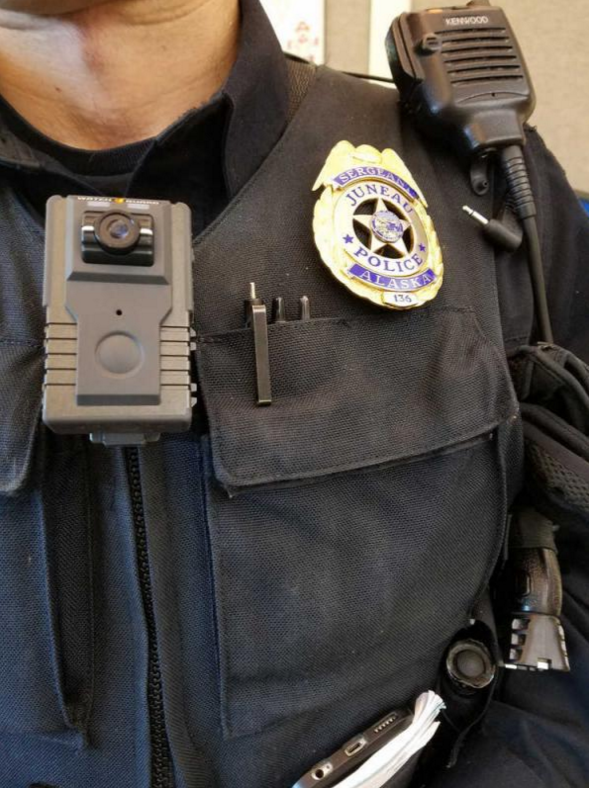Per the Juneau Police Department’s request, the Juneau Assembly appropriated about $19,000 to fund a body-camera initiative during its meeting Monday night. The most vocal opposition to the measure, which JPD has been moving toward for years, came from the only former member of the force serving on the Assembly.
“I understand the impetus behind going to body cameras, but I have a suspicion that not all of the legality with them has been worked out yet, and it will cost the city far more to have body cameras than not to have them,” Deputy Mayor Jerry Nankervis said.
Before he was a member of the Assembly, Nankervis worked as an officer for JPD. During his time on the force, Nankervis encountered what he noted as a problem with recording the actions of police, be it with audio recorders, dash cams or body cameras.
Then, like now, officers were required to keep audio recordings of their interactions with the community. During Monday’s meeting, Nankervis recounted a time when a judge threw out a citation he’d written because the interaction hadn’t been recorded.
According to Nankervis, body cameras also invade people’s privacy and in doing so exposes the city to litigation.
“I have some concerns about taking cameras into people’s houses and recording everything police do,” he said.
The way Juneau Chief of Police Bryce Johnson sees it, body cameras protect police officers from the very liabilities that Nankervis is worried about.
Concerned about protecting privacy, Assembly member Mary Becker asked Johnson on Monday what would happen if officers entered a home late at night and their body cameras captured indecent footage of the people inside.
“When an officer goes into Mr. Jones’ home, and the camera is on, and his wife comes out of his bedroom, and she’s ready for bed, that’s an invasion of privacy,” Becker said, jokingly using Assembly colleague Loren Jones for the sake of illustration.
Johnson didn’t argue, but he pointed out that if an officer is in a person’s home looking at somebody who doesn’t want to be seen, that person’s privacy has already been invaded.
At that point in Becker’s hypothetical scenario, the body camera footage will help reveal whether the invasion of privacy violated the law, Johnson said. In the case that the officer was in the right, the footage will protect him or her from any allegations of wrongdoing.
“The camera is going to accurately record what happened and protect the officer and the public because if the officer did something wrong we still want to know about it,” Johnson said. “I’m not here to say that body cameras are a perfect system or that all of the questions have been answered, but it is my professional opinion that the benefits far outweigh the drawbacks.”
The Assembly approved the appropriating ordinance that will help fund the body cameras with a 7–2 vote. Mayor Ken Koelsch was the only person other than Nankervis to object to the measure. He didn’t speak to his objection.
Late last month, the U.S. Department of Justice awarded JPD with a grant of about $25,000, a part of the Body-Worn Camera Policy and Implementation Program. That grant will help the department purchase 40 body cameras. In order for the department to access those federal funds, it has to put up nearly $27,000 of its own money, which is where the Assembly came in Monday.
JPD doesn’t have that money readily accessible in its budget. JPD will cover roughly $7,500 of the $27,000 match in personnel costs. The Assembly appropriated about $19,400 in asset forfeiture funds to cover the rest.
Asset forfeiture funds are illegal monies JPD has seized during arrests and operations.
Prison time for refusing to pay fines
To the dismay of Assembly member Jesse Kiehl, the Assembly amended city code, giving courts the ability to imprison defendants who haven’t paid (in any installment) a fine or restitution.
“I understand and appreciate that this very closely reflects a state law that is, and has been, on the books,” Kiehl said, objecting to the change Monday. “I think it’s a bad law, and we would do poorly to duplicate it.”
In an attempt to try and win his colleagues’ support, Kiehl argued that imprisoning people who don’t pay fines only feeds a “destructive cycle” of recidivism. Kiehl argued that under this system small fines become big fines, and big fines become jail time.
City Attorney Amy Mead said that the code change doesn’t pertain to people who are unable to pay fines; it’s about providing legal recourse for dealing with defendants who are able but unwilling to pay fines or restitution.
“It’s a way for the court to hold people accountable,” she said.
The Assembly passed the ordinance amending city code with a 7–2 vote. Kiehl and Assembly member Norton Gregory opposed the measure.
Under the new rules, “a term of imprisonment imposed under this section may not exceed one day for each $50 of the unpaid portion of the fine or restitution or one year, whichever is shorter.”
• Contact reporter Sam DeGrave at 523-2279 or sam.degrave@juneauempire.com.

